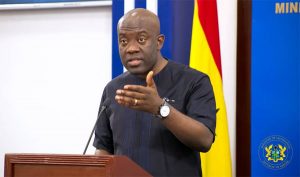Ghana, represented by its Ministry for Aviation claims to have reached a firm agreement with Egypt’s national airline Egypt Air, to establish a joint venture national flag carrier airline for the country.
Last week, Ghana’s aviation minister revealed that negotiations between the two counter-parties towards a mutually agreed structure for he proposed airline have been concluded. This means that the stage is almost set for commencement of processes to register the proposed new airline, capitalize it, establish the organizational structures and move to acquire or lease initial aircraft.
‘We have indeed completed negotiations that we need to conclude with our partner, Egypt Air, in this case, Aviation Minister Joseph Kofi Adda announced last week. All the issues that were outstanding in the past have been resolved. We have compiled all we need to compile, which includes the shareholders agreement, the business plan, to ensure that we get the approval of the key agencies from Ghana. Parliament is the only step left for us to have a national airline.”
However, while Parliamentary approval may indeed be the last major step required in the process that step may prove to be a very tricky one to navigate, following the series of shock results ion Ghana’s most recent Parliamentary elections held on December 7.
The ruling New Patriotic Party, although retaining the presidency in a hotly contested and subsequently disputed election, has lost its strong majority in the legislative house. When the next Parliament convenes in January 2021 the incumbent party with have the slimmest of majorities in terms of number of seats held and in practice may often face the challenge of having less parliamentary votes than the opposition since many of its parliamentarians may be absent due to ministerial duties. Under Ghana’s constitution at least half of its over 100 ministers must be drawn from Parliament.
The incumbent government’s alternative – pushing approval for the partnership with Egypt Air through before the end of the current sitting of `the legislature – is a most unlikely prospect given that Parliament will soon break for the end of year festivities and even before then the dispute over the results of last week’s general elections is likely to occupy the full attention of the political class.
Ghana’s decision to partner Egypt Air came as a surprise since it had been widely expected to conclude a similarly structured deal with Ethiopian Airlines, reputedly the most commercially successful state owned airline on the continent. It is still unclear why Ghana’s government ultimately backed away from that deal.
However Egypt Air is expected to take a majority equity stake in the impending new Ghanaian national flag carrier, a position that would both prevent state interference from inhibiting its commercial success – the primary cause of two failures in the past to maintain a national airline – and accommodate the precarious fiscal position of the Government of Ghana whose public debt passed the 70 percent debt sustainability threshold in October this year.
Earlier this year Ghana announced it was order three Boeing 777 Dream-liners although it is unknown whether this is still planned.
The new airline is expected to focus primarily on regional routes within Africa leveraging on Ghana’s position as Headquarters of the secretariat of the African Continental Free Trade Area, AfCFTA. However it is also expected to fly a few intercontinental routes to between Ghana and both the United Kingdom and the United States.






